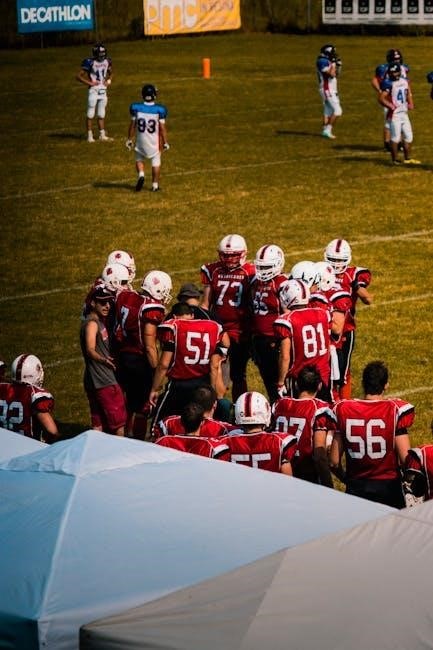This structured 7-day meal plan is designed to fuel athletic performance, aid recovery, and meet the unique nutritional needs of athletes, ensuring optimal energy and adaptability․
Overview of the Importance of Nutrition for Athletic Performance
Nutrition plays a pivotal role in enhancing athletic performance, accelerating recovery, and sustaining overall health․ A well-balanced diet provides the necessary energy, supports muscle repair, and optimizes physical endurance․ Athletes require adequate intake of carbohydrates for energy, proteins for muscle repair, and fats for sustained performance․ Proper hydration and electrolyte balance are also critical to maintain bodily functions during intense activities․ A structured meal plan ensures athletes meet their nutritional needs, adapt to training demands, and recover efficiently․ By prioritizing nutrition, athletes can maximize their potential, reduce injury risks, and achieve peak performance levels consistently․
Key Considerations for Customizing the Meal Plan
Customizing the meal plan involves tailoring it to individual needs, such as caloric intake, macronutrient balance, and dietary preferences․ Athletes must consider their sport, training intensity, and weight goals when adjusting portion sizes and food choices․ Hydration and electrolyte balance should also be personalized to prevent dehydration and maintain performance․ Additionally, incorporating post-workout nutrition and timing meals around training sessions can enhance recovery and energy levels․ Meal prepping and time management are crucial for consistency, while consulting a dietitian ensures the plan aligns with specific requirements․ This personalized approach guarantees the meal plan supports both performance and overall health effectively․

Understanding the Nutritional Needs of Athletes
Athletes require high energy intake, balanced macronutrients, and proper hydration to fuel performance and recovery․ Carbohydrates, proteins, and fats are essential for energy, muscle repair, and overall function․
Caloric Intake and Energy Requirements
Athletes’ caloric needs vary based on sport, training intensity, and goals․ A 7-day meal plan for athletes often ranges between 1,500 to 2,500 calories daily, ensuring adequate energy for performance and recovery․ For example, a male athlete’s meal plan might start at 1,800 calories, adjustable to 2,000 or 2,500 calories, while a female athlete might follow a 2,300-calorie plan․ These plans emphasize balanced macronutrients, with meals requiring about 30 minutes to prepare․ Protein intake is crucial, often exceeding 80 grams per day, alongside sufficient fiber․ Adjusting portion sizes and meal frequency helps meet individual energy demands, supporting both performance and recovery effectively․ Consulting a dietitian is recommended for personalized adjustments․
Macronutrient Balance: Carbohydrates, Proteins, and Fats
Athletes require a balanced intake of carbohydrates, proteins, and fats to optimize performance and recovery․ Carbohydrates are the primary energy source, with complex carbs like whole grains and vegetables providing sustained fuel․ Proteins are essential for muscle repair and growth, with recommendations of at least 80 grams daily․ Healthy fats, such as avocados and nuts, support overall health and hormone production․ A typical 7-day meal plan allocates 50% of calories to carbs, 25% to protein, and 25% to fats․ This balance ensures energy availability, muscle maintenance, and long-term health, tailored to meet the demands of training and competition while promoting recovery․
Hydration and Electrolyte Balance
Proper hydration and electrolyte balance are crucial for athletic performance and recovery; Athletes lose water and essential minerals like sodium, potassium, and magnesium through sweat, which can impair physical function if not replenished․ Aim to drink 8-10 glasses of water daily, adjusting for sweat loss․ Include electrolyte-rich foods such as bananas, nuts, and coconut water in meals․ Sports drinks can also help restore electrolytes during intense or prolonged activities․ Monitoring urine color (pale yellow indicates proper hydration) and consuming electrolyte supplements when necessary can prevent dehydration and maintain optimal bodily functions, ensuring peak performance and recovery throughout the 7-day meal plan․
Structuring the 7-Day Meal Plan
A well-organized meal plan ensures balanced nutrition, proper timing, and variety․ Each day includes breakfast, lunch, snacks, and dinner, tailored to meet energy needs and recovery goals․

Breakfast Options for Athletes
Breakfast is crucial for athletes, providing energy and nutrients to kickstart the day․ Options like oatmeal with fruit and nuts, eggs with whole-grain toast, or Greek yogurt with berries are ideal․ These meals offer a balance of carbohydrates, proteins, and healthy fats to sustain energy levels․ For convenience, smoothies with protein powder, spinach, and banana are also a great choice․ Ensuring adequate hydration with a glass of water or herbal tea complements these meals․ Variety is key to keep the diet engaging and nutritionally diverse, supporting both performance and recovery throughout the day․
Lunch and Snack Ideas to Fuel Performance
Lunch and snacks are vital for maintaining energy levels and supporting athletic performance․ Balanced meals like grilled chicken wraps with whole-grain tortillas, mixed greens, and avocado provide sustained energy․ Quinoa salads with lean proteins and colorful vegetables are also excellent options․ For snacks, nuts, fresh fruits, or protein bars are convenient and nutrient-dense choices․ Staying hydrated with water or electrolyte-rich beverages is equally important․ These meals and snacks are designed to replenish energy stores, support muscle function, and keep athletes fueled throughout the day, ensuring they perform at their best and recover effectively for upcoming training sessions․
Dinner Recipes for Recovery and Muscle Repair

Dinner plays a crucial role in recovery and muscle repair after a day of intense training․ Opt for protein-rich meals like grilled salmon with quinoa and steamed vegetables or barbecued chicken with roasted sweet potatoes and green beans․ These dishes provide essential amino acids for muscle repair and complex carbohydrates for energy replenishment․ Incorporating healthy fats, such as avocado or olive oil, supports overall recovery and satisfies hunger․ Staying hydrated with water or coconut water is also vital to maintain electrolyte balance․ These balanced dinners ensure athletes recover effectively, rebuild muscle tissue, and prepare for the next day’s challenges, making them a cornerstone of the 7-day meal plan․

Additional Tips for Success
Consistency, hydration, and timing are key․ Incorporate meal prepping, vary protein sources, and include healthy snacks to maintain energy levels and support recovery throughout the week․
Meal Prepping and Time Management
Meal prepping is essential for maintaining consistency and reducing stress․ Dedicate one day weekly to prepare meals, portioning them in containers for easy access․ Plan balanced meals in advance, ensuring variety and nutrient-dense options․ Use grocery lists to streamline shopping and avoid last-minute decisions․ Batch cooking, such as preparing large quantities of rice or proteins, saves time․ Incorporate snacks like nuts, fruits, and protein bars for quick energy․ Label and date meals to maintain organization․ This approach ensures athletes stay fueled, recover efficiently, and perform at their best without sacrificing nutrition for convenience․
Importance of Post-Workout Nutrition
Post-workout nutrition plays a crucial role in recovery, muscle repair, and performance enhancement․ Consuming a balanced mix of carbohydrates and protein within 30-60 minutes after exercise replenishes glycogen stores, reduces muscle soreness, and promotes lean muscle growth․ Aim for a ratio of 2:1 or 3:1 of carbohydrates to protein․ Examples include a protein shake with fruit or a meal like grilled chicken with quinoa․ Adequate hydration is also essential to restore electrolyte balance and support overall recovery․ Consistency in post-workout nutrition ensures athletes can train harder, recover faster, and achieve their performance goals effectively․ Prioritizing this step helps maintain peak physical condition and prevents fatigue buildup․
Downloading the PDF Version of the Meal Plan
Downloading the PDF version of this 7-day meal plan provides a convenient and organized way to access detailed meal schedules, recipes, and nutritional advice․ The PDF format ensures portability, allowing athletes to reference the plan anytime, anywhere․ It includes breakdowns of daily meals, portion sizes, and macronutrient balances tailored for performance and recovery․ Additionally, the PDF offers space for personal notes and adjustments, making it adaptable to individual preferences․ By downloading the PDF, athletes can easily track their progress, plan grocery trips, and stay consistent with their nutrition goals․ This resource is essential for anyone seeking a structured approach to fueling their athletic endeavors effectively․
Final Tips for Adapting the Plan to Individual Needs
Adapting the 7-day meal plan to individual needs ensures maximum effectiveness․ Athletes should adjust portion sizes based on their caloric requirements and activity levels․ Incorporating personal food preferences can enhance adherence, while monitoring progress helps refine the plan․ For vegetarian or vegan athletes, plant-based protein sources like legumes and tofu can replace meat․ Additionally, incorporating meal prepping and hydration strategies supports consistency․ Tailoring the plan to specific sports or training phases, such as increasing carbohydrates for endurance or proteins for strength, can optimize performance․ Regularly reviewing and updating the plan with a nutritionist ensures it evolves with changing goals and needs․
